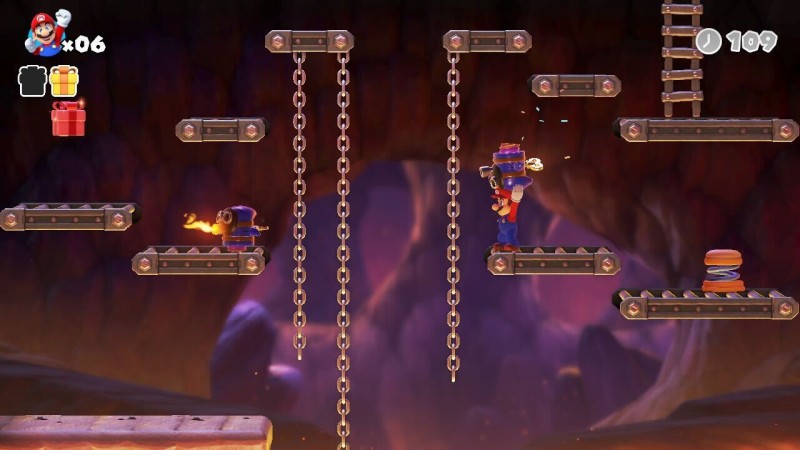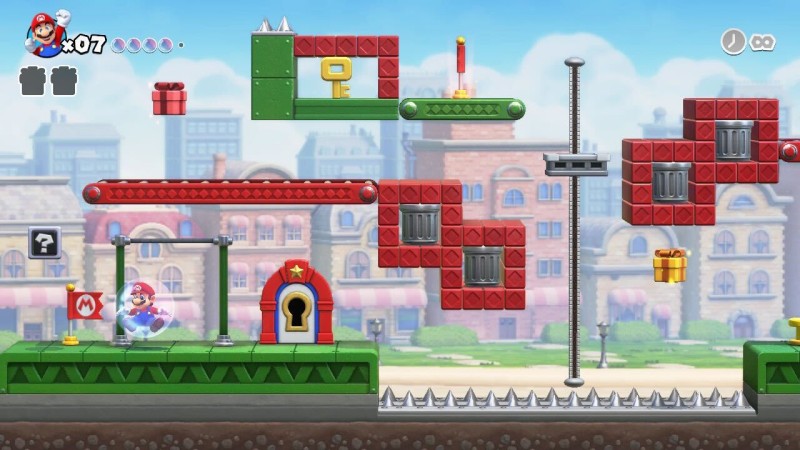Reviewed on:
Switch
Platform:
Switch
Release:
A developer can take many different approaches when remaking a game, but its primary goal always remains the same: to create a new experience that honors the spirit of the original. With Mario vs Donkey Kong, a remake of the 2004 Game Boy Advance title of the same name, Nintendo succeeds in this goal. By combining new worlds and modern quality-of-life features with the game’s classic, delightful puzzle design, Mario vs. Donkey Kong is a strong start to Nintendo’s 2024.
In the game’s opening, Donkey Kong raids a toy factory where they make Mini Marios, the hottest new product on the market. To get them back, Mario must chase him down through eight worlds, each with two distinct halves. In the first chunk, he has to carry a key to a locked door, and in the second, he has to reach the Mini Mario located somewhere in the level. On paper, it runs the risk of becoming repetitive, but in practice, there’s so much variety from level to level that I was never bored. With only six standard levels in each world, there’s a lot of room to play with mechanics and level design, and I was constantly impressed with how the game kept me engaged. It’s nothing revolutionary – these are still puzzles from 20 years ago – but they hold up better than many games from the same year.

The element of the game that I enjoyed the most was Mario’s versatility of movement. Between handstands, pivot jumps, and triple jumps, it’s a blast to move from one side of the stage to another. They’re necessary techniques in later levels, but early on, you can become the master of the space and skip entire sections if you know what you’re doing. Combining this with its intuitive puzzle design, Mario vs. Donkey Kong makes players feel smart and skilled even when the puzzles are relatively straightforward. Triple jumping out of a handstand over an enemy through the final collectible present and into the end of the level is thrilling every time you pull it off.
The game makes up for its age with a number of new features, my favorite of which is a “casual mode.” When activated, Mario no longer resets the level when he dies. Instead, he has a limited number of bubbles that he can use to respawn at nearby checkpoints upon taking damage. It opens the game to younger players or anyone who might get stuck more easily. The puzzles don’t get any less challenging, but the platforming becomes more forgiving, which makes the game less frustrating, especially in some tough-as-nails postgame levels.

This remake also adds two new worlds: Merry Mini-Land and Slippery Summit. While I found them to be a tad easier than the existing levels, they fit the style of the other stages well, and they’re welcome additions that slightly extend what was previously a short game. After beating the game, you also unlock a Time Attack mode for every completed level, adding a new challenge for willing players. Add on the + worlds (harder versions of all eight base worlds) and a series of expert stages, and the game has a healthy amount of content if you’re willing to dive in. Completing the plus worlds was enough of a challenge for me, but I was glad to know there was more to play if the mood struck.
Mario vs. Donkey Kong is a simple game, but as is the case with Mario’s best titles, there’s an elegance to that simplicity. Nintendo has done a stellar job adding features to make it more palatable to a modern audience, but it only comes together because of how well the classic levels hold up. Mario and Donkey Kong have been rivals for over 40 years, and this game admirably carries that legacy forward.
